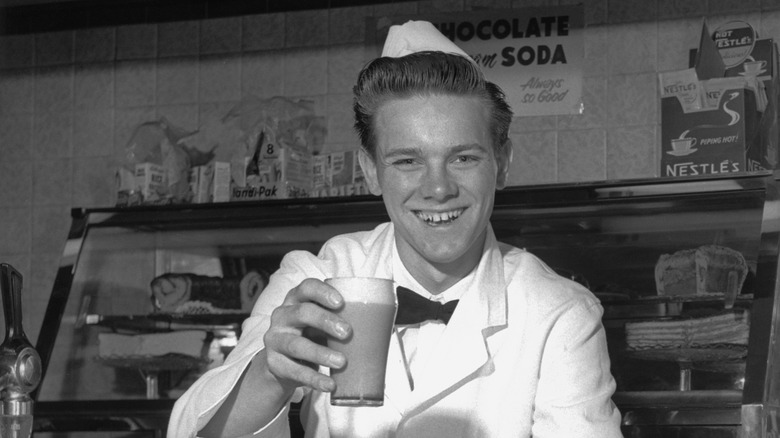The Origin Behind The Term 86'd Is More Complicated Than You Think
Language is ever-evolving. New words are always coming into use. For instance, Merriam-Webster added 200 words to the English dictionary in 2024. Similarly, other words that were once popular, like "crapulous" (meaning hungover), fall out of use. But some words stick around so long that their origins become obscure and leave etymologists making educated guesses at how they came to be. The term "86" (sometimes written out), meaning to eject someone from a bar or restaurant, falls into this category. And it's not even that old.
Over the years, the word has come to encompass a broader meaning — getting rid of something or someone. There's been a lot of speculation as to its origins, which dates to the 1930s. One of the best possible guesses pins it as slang used by workers at soda fountains and diners, who used "86" to refer to an item being sold out. Relatedly, the term may be a type of rhyming slang, with "86" standing in for "nix," as in to refuse to allow something. What is known is that the first time it was used in a published book was in 1944, and it related to a famed Hollywood actor.
The word was associated with a hard-partying Hollywood actor
The first known use of the term in a book, not surprisingly, was about the notoriously hard-drinking stage and screen actor John Barrymore. Among other issues, Barrymore's overuse of alcohol was such that he couldn't remember his lines and had to cheat by using cue cards. In "Good Night, Sweet Prince: The Life and Times of John Barrymore," author Fowler tells a story of how in 1910, Barrymore would get a young protege to sneak alcohol to him at LA's Belasco Theatre, but he would have to go to a bar where Barrymore wasn't known.
At the closest bar, the actor was considered an "eighty-six." "An 'eighty-six,' in the patois of Western dispensers, means: 'Don't serve him,'" Fowler wrote (via The Vancouver Sun). At the time Fowler was writing, the term was still fairly new and used as a noun, but a decade later, it began to be used as a verb. Though the term's origins are still a little hazy, there is some solid evidence for the soda-fountain connection.
Soda fountain lingo or something else?
A May 1933 newspaper article by Walter Winchell, the famed 20th-century newspaper columnist and radio broadcaster, is one of the first to link "86" to soda fountains. These were notably popular during Prohibition when ice cream became a bit of a substitute for alcohol. In his column, Winchell includes a glossary from a "Hollywood soda jerker," with various slang terms. "'Eighty six' means all out of it," Winchell wrote (via the Reading Times). Whether there was a jump from soda fountains to bars is up for debate, but there's a strong argument that the term is a kind of rhyming slang for the word "nix." Rhyming slang, while more prevalent in Cockney English, was also used in the American underworld, especially on the West Coast, well into the 1930s.
There have also been some less probable guesses involving the Old West and the Korean War. The former is related to serving drunken cowboys a lower-proof alcohol (86% rather than 100%). The latter refers to U.S. F-86 jet fighters shooting down enemy planes, which were then "86'd." This one can be discounted since the term was already well established by the 1950s. Other oddball possibilities include the common height and width of a doorframe (8 inches by 6 inches) and the typical amount of soup in an Army pot (that is, 86 ladles' worth). While there are a few possibilities that seem likely for the term's origin, there are others that can definitely be 86'd.


